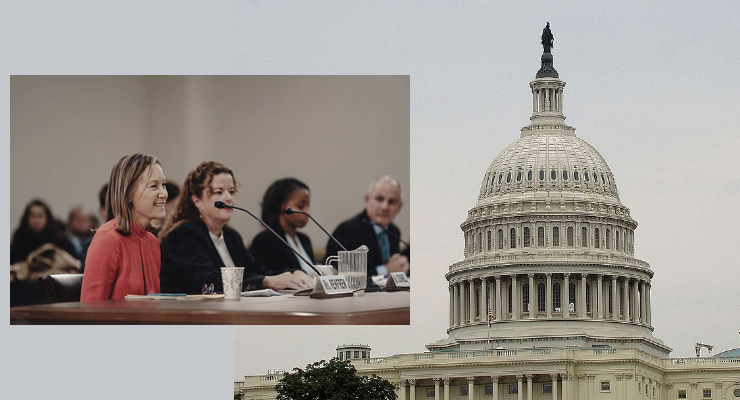06.24.21
This week, Beautycounter led two days of virtual lobbying on cosmetic reform with key Senators and Representatives. The brand was joined by members of Beautycounter's Science Advisory Council and the Counteract Coalition, a Beautycounter-led collective of businesses working together to help pass more health-protective laws in the beauty industry.
"Beautycounter believes in the power of advocacy to change our country's outdated laws in order to better protect consumers," said Gregg Renfrew, Beautycounter founder & CEO. "Consumers deserve federally regulated, health-protective safety standards, and I'm proud to work with our coalition of clean beauty brands as well as leaders in public health policy and medicine to push for change."
Updating Outdated Regulations
The $63 billion beauty industry in the United States is predominantly governed by the Federal Food, Drug, and Cosmetic Act, which was signed into law by President Franklin D. Roosevelt on June 25, 1938. Despite the industry's rapid growth, these regulations have stood largely unchanged.
The clean beauty sector of the cosmetics industry in the U.S. is estimated to be valued at $22 billion by 2024. With this growth comes an increasing need for stronger regulation by the Food and Drug Administration (FDA) to help combat misinformation and better protect consumers. Beautycounter has spent nearly a decade advocating for legislation that would allow the FDA to screen ingredients for safety, require more transparency from brands, clearly define widely used but underregulated terms like "natural," and have the ability to recall products that harm consumers.
"Products are increasingly chemically complex, and outdated testing strategies are often insufficient to accurately capture long-term risks from certain chemicals," said Dr. Joseph Laakso, director of science policy at the Endocrine Society and member of Beautycounter's Science Advisory Council. "As head of Science Policy at the Endocrine Society, we know that transparency is essential for consumers' ability to manage their exposures, and also valuable for scientists and physicians who want to have a more accurate understanding of our chemical exposures and potential health effects.”
Laakso added, “I'm encouraged by the actions of companies like Beautycounter that are aiming to be at the vanguard of product safety, while also improving testing methodologies and maximizing transparency. I hope that by participating on their Science Advisory Council and advocating for changes to our laws, I can help them advance these goals to improve the safety of personal-care products."
Delivering Results
Beautycounter and its community have sent over 200,000 emails, 175,000 texts, made 16,000 calls, and held 2,100 meetings with legislators in the U.S. and Canada, urging lawmakers to support cosmetic reform.
The brand has helped pass 10 pieces of legislation, and is currently working on a dozen more, including the Personal Care Products Safety Act – a bipartisan bill recently introduced by Senators Dianne Feinstein (D-Calif.) and Susan Collins (R-Maine). In 2019, Gregg Renfrew testified in a House hearing introducing the Cosmetic Safety Enhancement Act, leading to the first vote in Congress on a standalone cosmetics bill in over 80 years.
"Beautycounter believes in the power of advocacy to change our country's outdated laws in order to better protect consumers," said Gregg Renfrew, Beautycounter founder & CEO. "Consumers deserve federally regulated, health-protective safety standards, and I'm proud to work with our coalition of clean beauty brands as well as leaders in public health policy and medicine to push for change."
Updating Outdated Regulations
The $63 billion beauty industry in the United States is predominantly governed by the Federal Food, Drug, and Cosmetic Act, which was signed into law by President Franklin D. Roosevelt on June 25, 1938. Despite the industry's rapid growth, these regulations have stood largely unchanged.
The clean beauty sector of the cosmetics industry in the U.S. is estimated to be valued at $22 billion by 2024. With this growth comes an increasing need for stronger regulation by the Food and Drug Administration (FDA) to help combat misinformation and better protect consumers. Beautycounter has spent nearly a decade advocating for legislation that would allow the FDA to screen ingredients for safety, require more transparency from brands, clearly define widely used but underregulated terms like "natural," and have the ability to recall products that harm consumers.
"Products are increasingly chemically complex, and outdated testing strategies are often insufficient to accurately capture long-term risks from certain chemicals," said Dr. Joseph Laakso, director of science policy at the Endocrine Society and member of Beautycounter's Science Advisory Council. "As head of Science Policy at the Endocrine Society, we know that transparency is essential for consumers' ability to manage their exposures, and also valuable for scientists and physicians who want to have a more accurate understanding of our chemical exposures and potential health effects.”
Laakso added, “I'm encouraged by the actions of companies like Beautycounter that are aiming to be at the vanguard of product safety, while also improving testing methodologies and maximizing transparency. I hope that by participating on their Science Advisory Council and advocating for changes to our laws, I can help them advance these goals to improve the safety of personal-care products."
Delivering Results
Beautycounter and its community have sent over 200,000 emails, 175,000 texts, made 16,000 calls, and held 2,100 meetings with legislators in the U.S. and Canada, urging lawmakers to support cosmetic reform.
The brand has helped pass 10 pieces of legislation, and is currently working on a dozen more, including the Personal Care Products Safety Act – a bipartisan bill recently introduced by Senators Dianne Feinstein (D-Calif.) and Susan Collins (R-Maine). In 2019, Gregg Renfrew testified in a House hearing introducing the Cosmetic Safety Enhancement Act, leading to the first vote in Congress on a standalone cosmetics bill in over 80 years.




























